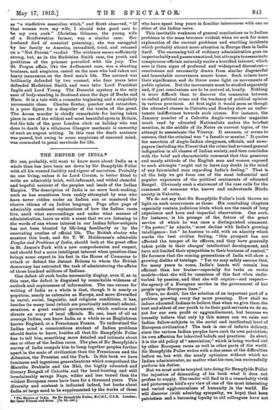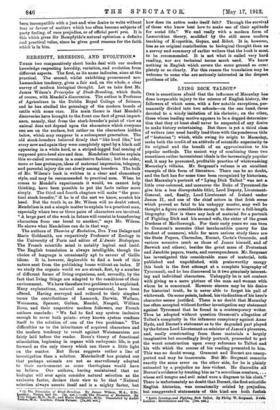THE EMPIRE OF INDIA.• No one, probably, will want to
know more about India as a whole than has here been set down by. Sir Bampfylde Fuller with all his wonted lucidity and vigour of narration. Probably no one living, unless it be Lord Curzon, is better fitted to write an admirably brisk, well-informed, and withal cheerful and hopeful account of the peoples and lands of the Indian Empire. The description of India is no mere book-making, such as has sometimes been rashly attempted by men who have never ridden under an Indian sun or mastered the elusive idioms of an Indian language. Page after page of admirably condensed explanations of how the Indian races live, amid what surroundings and under what manner of administration, leave us with a sense that we are listening to the words of one whose interest in our Indian fellow-subjects has not been blunted by life-long familiarity or by the enervating routine of official life. The British elector who masters this hook, and Sir T. W. Holderness's admirable Peoples and Problems of India, should look at the great office in St. James's Park with a new comprehension and respect, and should feel a more intelligent interest when question-time brings some expert to his feet in the House of Commons to attack or defend the distant Britons to whom the British democracy has entrusted the task of administering the affairs of three hundred millions of Indians.
One defect all such books necessarily display, even if, as in this case, the defect is disguised by remarkable wideness of outlook and copiousness of information. The one excuse for writing of India as a whole is that, though it is nearly as populous, nearly as extensive as Europe, and more diversified in racial, social, linguistic, and religious conditions, it has, besides its many local (which are practically national) admini- strations, a great central government, which controls and directs an army of local officials. No one, least of all an average Indian, can know India as a whole as an Englishman knows England, or a Frenchman France. To understand the Indian mind a conscientious student of Indian problems should desire to know, besides all that Sir Bampfylde Fuller Bras to tell him, something more detailed and intimate about .one or other of the Indian races. The plan of Sir Bampfylde's survey of India compels him to lump together peoples further apart in the scale of civilization than the Frenchman and the Albanian, the Prussian and the Turk. In this book we have luminous and ingenious generalisations which comprehend the Maratha Brahmin and the Bhil, the highly educated and literary Bengali of Calcutta and the head-hunting and still irreclaimably savage Naga, wilder and less tamed than the wildest European races have been for a thousand years. This diversity and contrast is indicated indeed, but books about India at large need to be supplemented by the works of those
- • The Em pits of India. By Sir Bampfylde Puller, C.I.B. London :
Sir Isaac Pitman and Sons. Us. 6d. net.) who have spent long years in familiar intercourse with one or other of the Indian races.
This inevitable weakness of general conclusions as to Indian problems in the mass becomes evident when we seek for some explanation of the current problems and startling incidents which probably attract more attention in Europe than in India itself. The unceasing toil of ordinary administration goes on imperturbably and passes unnoticed, but attempts to assassinate conspicuous officials naturally excite a horrified interest, which sees in them signs of profound and widespread discontent— conclusions not necessarily drawn from similar disgraceful and lamentable occurrences nearer home. Such crimes have their significance, and do throw some light on movements of public opinion. But the movements must be studied separately and, if just conclusions are to be arrived at, locally. Nothing is more difficult than to discover the connexion between so-called political crime and the tendency of political opinion in various provinces. At first sight it would seem as though the educated classes in Calcutta and Bombay show an unfor- tunate indifference towards such crimes. For instance, the January number of a Calcutta Anglo-vernacular magazine much read by educated Nationalists makes the briefest mention, in the middle of its Notes on current topics, of the attempt to assassinate the Viceroy. It assumes, or seems to assume, that the criminal was "a fanatic or maniac." It quotes the assertion of Anglo-Indian clergymen, officials, and news- papers (including the Times) that the crime bad aroused general indignation in all classes of Indian society, and then concludes with the brief and characteristic comment that this generous and manly attitude of the English men and women exposed to such attempts " ought not to leave any doubt in the mind of any fairminded man regarding India's feeling." That is all the help we get from one of the most influential and popular exponents of the political sentiments of educated Bengal. Obviously such a statement of the case calls for the comment of someone who knows and understands Hindu society in Calcutta.
We do not say that Sir Bampfylde Fuller's book throws no light on such occurrences as these. His concluding chapters especially contain judicious hints which are the result of long experience and keen and impartial observation. One such, for instance, is his presage of the future of the great service of which he was once a distinguished ornament. " Its power," he admits, " must decline with India's growing intelligence : but " he hastens to add, with an alacrity which marks the best civilian feeling, " this prospect has not affected the temper of its officers, and they have generally taken pride in their charges' intellectual development, and have not limited their sympathies to their business of control." He foresees that the coming generations of India will show a growing dislike of tutelage. " Yet we may safely assume that, for many years to come, India's hands will remain less efficient than her brains—especially for tasks on exotic models—that she will be conscious of this fact when undis- turbed by passion, and that she will require—and respect— the agency of a European service in the government of her people upon European lines."
There, no doubt, lies the solution of an important part of a problem growing every day more pressing. How shall we induce educated Indians to believe that when we give them the best and ablest of our youth to be their paid servants we do so, not for our own profit or aggrandisement, but because we honestly believe that only by this means can we raise our Indian fellow-subjects to the social and intellectual level of European civilization P The task is one of infinite delicacy, since the various Indian peoples have each its own patriotism, its own affection for inherited beliefs and practices. In short, it is the old policy of " association," which is being worked out by other European races as well in other parts of the world. Sir Bampfylde Fuller writes with a due sense of the difficulties before us, but with the manly optimism without which no Indian administrator, no matter what his race;can successfully perform his duties.
But we must not be tempted into doing Sir Bampfylde Fuller the injustice of demanding of his book what it does not profess to supply. The reader will find in it a remarkably vivid and picturesque bird's-eye view of one of the most interesting and varied agglomerations of humanity in the world. He will discover (with admiring sympathy, we hope) that keen patriotism and a becoming loyalty to old colleagues have not
been incompatible with a just and wise desire to write without fear or favour of matters which too often become subjects of party feeling, of race prejudice, or of official part/ pris. It is this which gives Sir Bampfylde'e natural optimism a definite and practical value, since he gives good reasons for the faith which is in him.











































 Previous page
Previous page